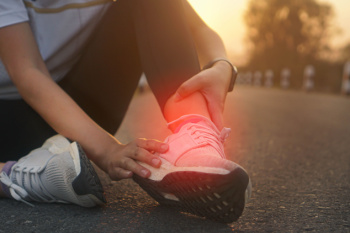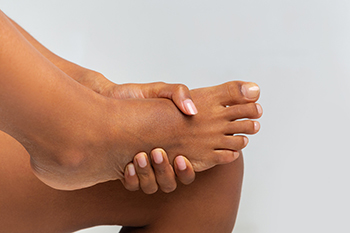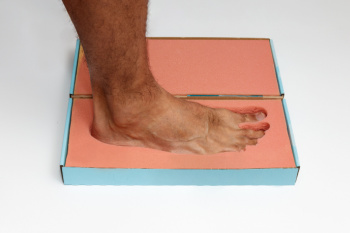Items filtered by date: June 2024
Relief for Acute Ankle Sprains

Acute ankle sprains are often caused by sudden twists that stretch or tear ligaments surrounding the ankle, causing pain, swelling, and difficulty while walking. Immediate treatment for an acute ankle sprain is important for effective recovery and to prevent long-term complications. Supportive measures include a lace-up brace, an air stirrup brace, or an elastic compression wrap to stabilize the injured ankle and promote faster healing. Early mobilization, as tolerated by pain levels, has been shown to aid in quicker recovery and reduce the risk of chronic ankle instability. Pain relief medications can help to manage inflammation and discomfort. Athletes and those prone to recurrent sprains may wish to consider using ankle supports during sports to prevent future injuries. If you have recently sprained your ankle or are experiencing persistent discomfort, it is suggested that you schedule an appointment with a podiatrist for a personalized treatment plan to ensure proper healing, and to minimize the chance of future ankle problems.
Ankle sprains are common but need immediate attention. If you need your feet checked, contact Anas Khoury, DPM from North Eastern Foot & Ankle Specialists. Our doctor can provide the care you need to keep you pain-free and on your feet.
How Does an Ankle Sprain Occur?
Ankle sprains take place when the ligaments in your ankle are torn or stretched beyond their limits. There are multiple ways that the ankle can become injured, including twisting or rolling over onto your ankle, putting undue stress on it, or causing trauma to the ankle itself.
What Are the Symptoms?
- Mild to moderate bruising
- Limited mobility
- Swelling
- Discoloration of the skin (depending on severity)
Preventing a Sprain
- Wearing appropriate shoes for the occasion
- Stretching before exercises and sports
- Knowing your limits
Treatment of a Sprain
Treatment of a sprain depends on the severity. Many times, people are told to rest and remain off their feet completely, while others are given an air cast. If the sprain is very severe, surgery may be required.
If you have suffered an ankle sprain previously, you may want to consider additional support such as a brace and regular exercises to strengthen the ankle.
If you have any questions please feel free to contact our office located in Passaic, NJ . We offer the newest diagnostic and treatment technologies for all your foot and ankle needs.
Do You Suffer From Painful Feet?
Custom Orthotics Provide Relief From Heel Pain

Experiencing persistent heel pain? Custom Orthotics might be your solution. These custom-designed shoe inserts adapt to your unique foot structure, optimizing support and alleviating discomfort. By redistributing pressure, they can significantly reduce heel pain, enhancing your daily mobility. Dive into a pain-free lifestyle and elevate your walking experience. Curious about the benefits of Custom Orthotics?
Contact our office today.
Causes of Chronic Foot Pain

Chronic foot pain is more than just a nuisance, It can significantly impact your daily life and mobility. Trauma, whether from a sudden injury or repetitive strain, can lead to a variety of foot issues including sprains, strains, and stress fractures. Overuse injuries, common among athletes and those with physically demanding jobs, can result in conditions like Achilles tendonitis and plantar fasciitis. Biomechanical factors, such as improper footwear or structural misalignment, can also contribute to chronic foot pain by causing conditions like bunions, corns, and neuromas. Underlying medical conditions, such as diabetes, gout, and peripheral neuropathy, can result in foot pain and increase the risk of complications. Additionally, infections like athlete's foot or ingrown toenails can cause persistent discomfort if not properly treated. If chronic foot pain is limiting your mobility and interfering with daily activities, it is suggested that you make an appointment with a podiatrist for an exam and treatment.
Foot Pain
Foot pain can be extremely painful and debilitating. If you have a foot pain, consult with Anas Khoury, DPM from North Eastern Foot & Ankle Specialists. Our doctor will assess your condition and provide you with quality foot and ankle treatment.
Causes
Foot pain is a very broad condition that could be caused by one or more ailments. The most common include:
- Bunions
- Hammertoes
- Plantar Fasciitis
- Bone Spurs
- Corns
- Tarsal Tunnel Syndrome
- Ingrown Toenails
- Arthritis (such as Gout, Rheumatoid, and Osteoarthritis)
- Flat Feet
- Injury (from stress fractures, broken toe, foot, ankle, Achilles tendon ruptures, and sprains)
- And more
Diagnosis
To figure out the cause of foot pain, podiatrists utilize several different methods. This can range from simple visual inspections and sensation tests to X-rays and MRI scans. Prior medical history, family medical history, and any recent physical traumatic events will all be taken into consideration for a proper diagnosis.
Treatment
Treatment depends upon the cause of the foot pain. Whether it is resting, staying off the foot, or having surgery; podiatrists have a number of treatment options available for foot pain.
If you have any questions, please feel free to contact our office located in Passaic, NJ . We offer the newest diagnostic and treatment technologies for all your foot care needs.
Custom-Made Orthotics Are Superior to Prefabricated Orthotics
 Custom-made foot orthotics are specially designed insoles tailored to an individual's unique foot structure and gait. Unlike prefabricated orthotics, which are mass-produced and may not address specific foot issues, custom orthotics are crafted based on a detailed assessment of the user's feet. This assessment often includes a physical examination, gait analysis, and sometimes imaging techniques like X-rays or 3D scans. Custom orthotics provide superior comfort and effectiveness, offering precise support and alignment that can alleviate a range of conditions, such as plantar fasciitis, flat feet, bunions, and arthritis. They help redistribute pressure, improve balance, and enhance overall foot function, which can prevent further complications and improve quality of life. The production process involves taking a mold or digital impression of the feet, which is then used to fabricate the orthotic device using high-quality materials. If you are interested in custom-made orthotics, it is suggested that you consult a podiatrist to ensure you receive orthotics that meet your specific needs.
Custom-made foot orthotics are specially designed insoles tailored to an individual's unique foot structure and gait. Unlike prefabricated orthotics, which are mass-produced and may not address specific foot issues, custom orthotics are crafted based on a detailed assessment of the user's feet. This assessment often includes a physical examination, gait analysis, and sometimes imaging techniques like X-rays or 3D scans. Custom orthotics provide superior comfort and effectiveness, offering precise support and alignment that can alleviate a range of conditions, such as plantar fasciitis, flat feet, bunions, and arthritis. They help redistribute pressure, improve balance, and enhance overall foot function, which can prevent further complications and improve quality of life. The production process involves taking a mold or digital impression of the feet, which is then used to fabricate the orthotic device using high-quality materials. If you are interested in custom-made orthotics, it is suggested that you consult a podiatrist to ensure you receive orthotics that meet your specific needs.
If you are experiencing discomfort in your feet and would like to try custom orthotics, contact Anas Khoury, DPM from North Eastern Foot & Ankle Specialists. Our doctor can provide the care you need to keep you pain-free and on your feet.
What Are Custom Orthotics?
Custom orthotics are inserts you can place into your shoes to help with a variety of foot problems such as flat feet or foot pain. Orthotics provide relief and comfort for minor foot and heel pain.
Over-the-Counter Inserts
Shoe inserts come in a wide variety and are used to treat foot pain, heel pain, and minor problems. For example, arch supports can be inserted into your shoes to help correct overarched or flat feet, while gel insoles are often used because they provide comfort and relief from foot and heel pain by alleviating pressure.
Prescription Orthotics
If over-the-counter inserts don’t work for you or if you have a more severe foot concern, it is possible to have your podiatrist prescribe custom orthotics. These high-quality, custom inserts are designed to treat problems such as abnormal motion, plantar fasciitis, and severe forms of heel pain. They can even be used to help patients suffering from diabetes by treating foot ulcers and painful calluses and are usually molded to your feet individually, which allows them to provide full support and comfort.
If you're experiencing minor to severe foot or heel pain, it’s recommended to speak with your podiatrist about the possibility of using custom orthotics or shoe inserts. A podiatrist can determine which type of custom orthotic or shoe insert is right for you and help you take the first steps toward being pain-free.
If you have any questions please contact our office located in Passaic, NJ . We offer the newest diagnostic and treatment technologies for all your foot and ankle needs.
Wearing High Heels to Work
 Wearing high heels to work every day can have a significant effect on the feet and the rest of the body. High heels shift body weight forward, increasing pressure on the forefoot and leading to conditions like bunions, hammertoes, and metatarsalgia. The unnatural angle of the foot can cause calf muscle tightening and Achilles tendon shortening, resulting in discomfort and pain. Over time, high heels can alter posture, leading to lower back, hip, and knee pain due to misalignment of the spine and joints. Wearing high heels may seem glamorous, but it can also cause pain, blisters, and calluses. To mitigate these effects, choose heels with lower heights, opt for wedges or platforms for better weight distribution, and use cushioned insoles. It can also help to regularly stretch the calves and feet, and alternating with more supportive footwear. If you enjoy wearing heels to work and you have persistent foot pain, it is suggested that you schedule an appointment with a podiatrist for advice and care.
Wearing high heels to work every day can have a significant effect on the feet and the rest of the body. High heels shift body weight forward, increasing pressure on the forefoot and leading to conditions like bunions, hammertoes, and metatarsalgia. The unnatural angle of the foot can cause calf muscle tightening and Achilles tendon shortening, resulting in discomfort and pain. Over time, high heels can alter posture, leading to lower back, hip, and knee pain due to misalignment of the spine and joints. Wearing high heels may seem glamorous, but it can also cause pain, blisters, and calluses. To mitigate these effects, choose heels with lower heights, opt for wedges or platforms for better weight distribution, and use cushioned insoles. It can also help to regularly stretch the calves and feet, and alternating with more supportive footwear. If you enjoy wearing heels to work and you have persistent foot pain, it is suggested that you schedule an appointment with a podiatrist for advice and care.
High heels have a history of causing foot and ankle problems. If you have any concerns about your feet or ankles, contact Anas Khoury, DPM from North Eastern Foot & Ankle Specialists. Our doctor can provide the care you need to keep you pain-free and on your feet.
Effects of High Heels on the Feet
High heels are popular shoes among women because of their many styles and societal appeal. Despite this, high heels can still cause many health problems if worn too frequently.
Which Parts of My Body Will Be Affected by High Heels?
- Ankle Joints
- Achilles Tendon – May shorten and stiffen with prolonged wear
- Balls of the Feet
- Knees – Heels cause the knees to bend constantly, creating stress on them
- Back – They decrease the spine’s ability to absorb shock, which may lead to back pain. The vertebrae of the lower back may compress.
What Kinds of Foot Problems Can Develop from Wearing High Heels?
- Corns
- Calluses
- Hammertoe
- Bunions
- Morton’s Neuroma
- Plantar Fasciitis
How Can I Still Wear High Heels and Maintain Foot Health?
If you want to wear high heeled shoes, make sure that you are not wearing them every day, as this will help prevent long term physical problems. Try wearing thicker heels as opposed to stilettos to distribute weight more evenly across the feet. Always make sure you are wearing the proper shoes for the right occasion, such as sneakers for exercising. If you walk to work, try carrying your heels with you and changing into them once you arrive at work. Adding inserts to your heels can help cushion your feet and absorb shock. Full foot inserts or metatarsal pads are available.
If you have any questions please feel free to contact our office located in Passaic, NJ . We offer the newest diagnostic and treatment technologies for all your foot and ankle needs.
Strategies for Preventing Falls in the Workplace

In any workplace, the safety and well-being of employees are paramount, and preventing falls is a key aspect of maintaining a secure environment. Employers can implement various strategies to mitigate the risk of falls and minimize potential injuries. One effective method is to maintain a clean and organized workspace, free from clutter or obstacles that could cause tripping hazards. Ensuring proper lighting throughout the premises enhances visibility and reduces the likelihood of missteps. Additionally, installing handrails, guardrails, or non-slip surfaces in areas prone to falls, such as staircases or slippery floors, provides essential support and stability. Regular maintenance of equipment and infrastructure also plays a vital role in preventing accidents. Additionally, comprehensive employee training programs on fall prevention techniques and safety protocols empower workers to identify risks and take proactive measures. If you have a foot injury as a result of falling during your workday, it is suggested that you consult a podiatrist who can offer effective treatment options.
Preventing falls among the elderly is very important. If you are older and have fallen or fear that you are prone to falling, consult with Anas Khoury, DPM from North Eastern Foot & Ankle Specialists. Our doctor will assess your condition and provide you with quality advice and care.
Every 11 seconds, an elderly American is being treated in an emergency room for a fall related injury. Falls are the leading cause of head and hip injuries for those 65 and older. Due to decreases in strength, balance, senses, and lack of awareness, elderly persons are very susceptible to falling. Thankfully, there are a number of things older persons can do to prevent falls.
How to Prevent Falls
Some effective methods that older persons can do to prevent falls include:
- Enrolling in strength and balance exercise program to increase balance and strength
- Periodically having your sight and hearing checked
- Discuss any medications you have with a doctor to see if it increases the risk of falling
- Clearing the house of falling hazards and installing devices like grab bars and railings
- Utilizing a walker or cane
- Wearing shoes that provide good support and cushioning
- Talking to family members about falling and increasing awareness
Falling can be a traumatic and embarrassing experience for elderly persons; this can make them less willing to leave the house, and less willing to talk to someone about their fears of falling. Doing such things, however, will increase the likelihood of tripping or losing one’s balance. Knowing the causes of falling and how to prevent them is the best way to mitigate the risk of serious injury.
If you have any questions, please feel free to contact our office located in Passaic, NJ . We offer the newest diagnostic and treatment technologies for all your foot care needs.

